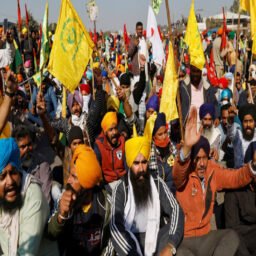INTRODUCTION
India is a democratic country and provides various rights to its citizens. There are some basic rights and some fundamental rights provided to the citizens. Sometimes government authorities themselves took these rights from the people and one of the examples of these is extrajudicial killings. In extrajudicial killings, police authorities kill the accused person without permission. Police have the power to kill the accused person but only under certain circumstances. There are various rights provided to an accused person under the constitution as well as other laws but extrajudicial killings deny the accused person to avail their rights. We can see various cases of extrajudicial killings in the last few years like killings of accused of Hyderabad rape case[1] or killing of Vikash Dubey[2] etc. The act of killing an accused person by government officials without permission is known as extrajudicial killing. In this, the person who is arrested in an allegation of commission of any crime is being killed without taking permission from the court. Extrajudicial killings are not new in India, from the British time itself we have witnessed this form of killing. Law provides power to the police officer to kill a person during an arrest[3] but police after arresting the person and without being authorized by court kill the accused person. Some procedures have to be followed while or after arresting the person.
VIOLATION OF FUNDAMENTAL RIGHTS
Extrajudicial killings are a clear violation of rights provided by the law to the people. An arrested person has some rights after being arrested and extrajudicial killings are a violation of those rights of the accused person. Police must maintain law and order and help the government in the enforcement of these laws. Laws provide equality to all the citizens, so why do some accused people refrain from enjoying the rights provided to them. The judiciary has the power to declare any person guilty based on shreds of evidence and procedure and give them punishment accordingly. Sometimes innocent people are also killed by the police in their fake encounters.
Extrajudicial killings violate various fundamental rightsf the accused person. Fundamental rights like Article 14[4] which provides the Right to Equality, Article 21[5] which provides the right to life and personal liberty, Article 22[6] which protects against arrest and detention are being violated in cases of extrajudicial killings. Articles 21 provide that every individual has the right to life and personal liberty except according to procedure established by law, extrajudicial killings is not the procedure established by law to take the life of a person. People have the right to a fair trial and proper investigation. There are provisions of natural justice in our judiciary system that provide that no party should be left unheard and the court cannot decide the matter or a person guilty without hearing the accused person. Everyone is entitled to a fair trial after their arrest but extrajudicial killings discard the person from this right. India follows the principles like ‘Innocent until proven guilty’[7], in extra-judicial killings person do not get the chance to prove themselves innocent and are killed by the police. There are mere chances that the innocent person may be killed by the police without being guilty. Indian constitution provides equal opportunity to all citizens and this applies even to the accused person that they should be given equal opportunity to prove themselves innocent.
CASES OF EXTRAJUDICIAL KILLINGS IN INDIA
In the case of People’s Union of civil liberties & another v State of Maharashtra & other[8], the writ petition was filed by People’s Union of Civil Liberties against the encounter killings by Mumbai police between 1995 and 1997. There were over 90 accused killed by the Mumbai police in the encounter. The Supreme Court held that it was a violation of Article 21[9] provided by the Indian Constitution. Article 21 provides the right to life and even the government has no authority to violate this right of citizens. Supreme Court also held that encounters must be investigated and provide certain guidelines for investigation of encounter killings.
In December 2019, a 27-year-old veterinarian was raped[10] and murdered and her body was burnt. The four accused persons were killed by the police while investigating the matter at the crime scene contending that they were trying to escape. This is a case of extrajudicial killings where the accused person did not get the chance to represent themselves in court. It is a grave violation of their fundamental rights and there is no such investigation done in this case of extrajudicial killing.
In 2020, Uttar Pradesh police killed a person named Vikash Dubey[11]. He was a criminal who killed various people and was in the news since he killed eight police officers in a village in Kanpur. He was arrested by the police of Madhya Pradesh and they transfer his custody to Uttar Pradesh police. While bringing him back to Uttar Pradesh, police killed him and said that he was trying to escape by snatching the pistol of one of the police officers. There was no proper investigation done of this case of extrajudicial killing. There are various other cases of extrajudicial killings in which some are reported and some are not. To kill a person without hearing them or without allowing them to prove themselves innocent is a violation of their rights.
CONCLUSION
A person who is arrested by police in suspect of a commission of a crime remains in custody for investigation until they get bail. There are some rights given to the accused person when they are in custody, but extrajudicial killings are not just the killing of a person but also the killing of their rights. They do not get a chance to prove their innocence. They do not get the proper opportunity to represent themselves in court. There should be some rules and regulations to control these killings and should be followed by every state and authority. Police should follow these rules and regulations while dealing with the accused person. Extrajudicial killings are a violation of fundamental rights like Article 14, Article 21, Article 22, etc. There is a need for changes in the criminal justice system and to make the process more transparent.
Author(s) Name: Aadya Dipti (Banasthali Vidyapith, Rajasthan)
References:
[1] Abinay Deshpande, Hyderabad veterinarian case: Rape, rage and exchange of fire, The Hindu (Dec. 14, 2019, 12:15 AM), https://www.thehindu.com/news/national/telangana/rape-rage-and-an-exchange-of-fire/article30300278.ece
[2] Omar Rashid, Ganster Vikash Dubey shot dead in ‘ exchange of fire’, The Hindu (JULY 10, 2020, 8:16 AM), https://www.thehindu.com/news/national/other-states/gangster-vikas-dubey-dead-says-up-police/article32038219.ece
[3] The Code of Criminal Procedure, 1973 (2 of 1974), Acts of Parliament, 1973
[4] INDIA CONST. art.14
[5] INDIA CONST. art.21
[6] INDIA CONST. art.22
[7] Maneka Gandhi v Union of India, 1978 AIR 597 (India).
[8] People’s Union of civil liberties & another v State of Maharashtra & other, CDJ 2014 SC 831 (India).
[9]INDIA CONST. art.21
[10] Abinay Deshpande, Hyderabad veterinarian case: Rape, rage and exchange of fire, The Hindu (Dec. 14, 2019, 12:15 AM), https://www.thehindu.com/news/national/telangana/rape-rage-and-an-exchange-of-fire/article30300278.ece
[11] Omar Rashid, Ganster Vikash Dubey shot dead in ‘ exchange of fire’, The Hindu (JULY 10, 2020, 8:16 AM), https://www.thehindu.com/news/national/other-states/gangster-vikas-dubey-dead-says-up-police/article32038219.ece
















